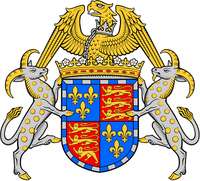Lady Margaret Boat Club
| Lady Margaret Boat Club | |
|---|---|
|
| |
 | |
| Motto | Si je puis (French, "If I can") |
| Location | Cambridge |
| Coordinates | 52°12′48.5″N 0°7′34″E / 52.213472°N 0.12611°ECoordinates: 52°12′48.5″N 0°7′34″E / 52.213472°N 0.12611°E |
| Home water | River Cam |
| Founded | 1825[1] |
| Affiliations | St John's College, University of Cambridge, BR |
| Website | http://www.ladymargaretboatclub.org |
| Notable members | |
| Patrick Colquhoun | |
The Lady Margaret Boat Club (often abbreviated to "LMBC" and familiarly known as "Maggie") is the rowing club for members of St John's College, Cambridge, England. The club is named after Lady Margaret Beaufort, founder of the College. In the May Bumps, the Lady Margaret men's first boat is currently Head of the River (May Bumps 2016).
History
LMBC was founded in 1825 by twelve members of the College as the first college boat club in Cambridge. In its original rules, the Club was to "consist of eighteen contributing members, besides honorary ones", and all members had to be able to row. An early member was Patrick Colquhoun who in 1837 instigated the Colquhoun Sculls, in the year in which he won the Wingfield Sculls.
The greatest influence in the 1860s and 1870s was J. H. D. Goldie, who raised LMBC to the "Headship of the River", won the "Colquhoun Sculls", and stroked Cambridge four times. The Goldie Boathouse, used by the university crews, commemorates his services to Cambridge rowing as does the name of the university second VIII, officially known as the Goldie Crew (or Boat) and competes annually against Isis just before the University Boat Race. Another important name in LMBC history is LHK Bushe-Fox who had a long career with LMBC, becoming President of the Club in 1897. One of the greatest influences of this century was Roy Meldrum who established the "Lady Margaret" style, which he detailed in his rowing books.

The Boathouse was opened in the May term of 1901. It was extended in the 1970s, and was the first boathouse to have a workshop for the boatman. In the early 1980s, when the college began to admit women, further modifications were made upstairs to create the women's changing rooms. The boathouse was extended further in 2000 to create more indoor training space. A shed is now being built to house the club's fours, which are currently racked outside.
The Club's heyday was in the late 1940s and 1950s. LMBC won the "Ladies Plate" in 1949 with a new course record. In 1950, they made 4 bumps to go "Head of the Mays", and stayed "Head" for five years. In 1951, Lady Margaret won the Grand at Henley Royal Regatta and had five members of the successful Cambridge crew, which also defeated Harvard and Yale in the United States.
Between 1975 and 1981, Lady Margaret were Head of the Lent Bumps for 26 consecutive days, the longest continuous defence of the Lent Headship. LMBC took the May Headship on day 4 of the 2016 races (bumping Caius), the first time they had held the Headship since 1989.
Traditions
Members of the club are well known for their scarlet jackets, which gave rise to the term blazer. Members with "First May Colours" are entitled to wear trim and gold buttons on their blazer, while "First Lent" or "Second May Colours" are entitled to wear silver buttons on their blazer.[1]
The club is traditionally strong in the Lent and May CUCBC Bumps race. Due to its affiliation with St. John's College, the club always fields many, often very successful, boats with first time rowers during the first university term. Club members also often go to row with university lightweight and heavyweight crews to compete against Oxford.
The club motto has been "Si je puis" ("If I can") since 1825. The boat club song, Viva laeta, has a chorus that goes as follows:
- Vive laeta, Margareta, Beatorum insulis; Si possimus, Fuerimus, Semper caput fluminis.
Although the music is printed in the boat club's history and the song is sung at every Boat Club Dinner, few members know the tune. Dinners are also known for more controversial songs (such as the infamous "M2 song" sung by all current and past members of the Second Men's May Bumps Crew).
A strange tradition takes place during the Bumps weeks in Lent and May term, known as the "Stomp". Crews gather on the College Backs every morning preceding the races. One crew at a time will stop at a lone tree, knock three times on its trunk and shout out the name of the crew that will be starting in front of them that day to be "bumped". The whole club then strolls through the backs towards archrivals Trinity. Once in Trinity College's great court, a standoff between the rival boatclubs occurs followed by a tackling session in which boatclub members from each side attempt to "kidnap" members of the opposite club. If captured, one is put to shame by being bought breakfast in the rival college's hall.
See also
References
- Durack, John; Gilbert, George; Marks, Dr. John (2000). The Bumps: An Account of the Cambridge University Bumping Races 1827-1999 ISBN 0-9538475-1-9
- CUCBC (various years) - Lent and May Bumps programmes.

